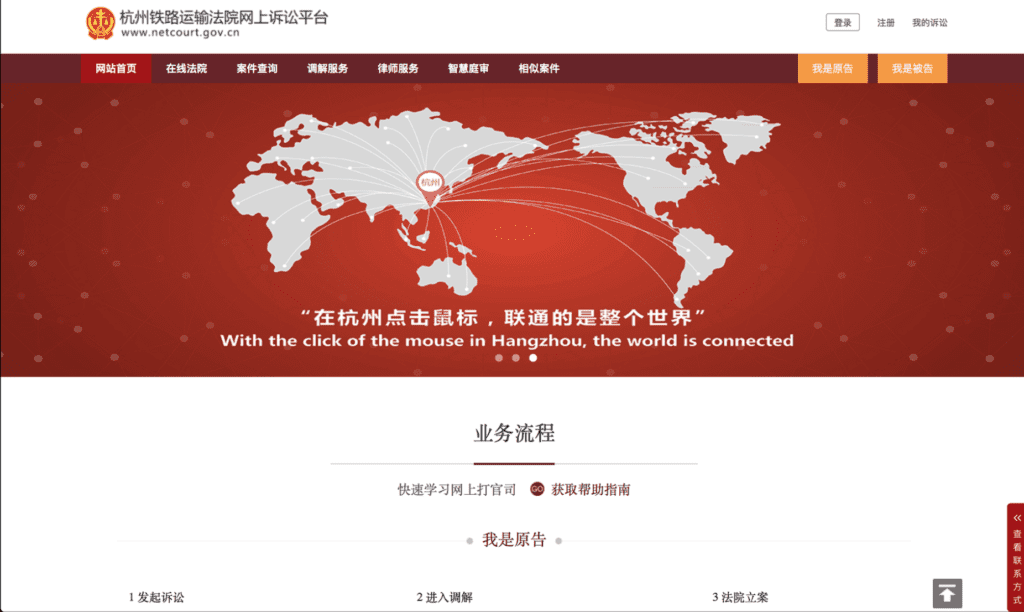China has adopted a plan to establish a cyberspace court in Hangzhou. The plan is for this court to accept filings electronically, try cases via livestream and hear only e-commerce and Internet related cases.
Why Hangzhou?
Under Chinese civil procedure law, lawsuits must be brought in the place of the defendant’s domicile. For companies, domicile means the principal place of business or the place where it has its registered address. Hangzhou is home to Alibaba and to many other technology companies, it has been dubbed the “capital of Chinese e-commerce,” and it is the site of the China Cross-Border E-Commerce Comprehensive Test Zone (中国(杭州)跨境电子商务综合试验区). Hangzhou courts have experienced a considerable increase in the number of e-commerce related cases, from 600 cases accepted in 2013 to more than 10,000 in 2016.
Before these most recent plans for a cyber-court in Hangzhou, the Zhejiang High Court launched a pilot program to create Zhejiang E-Commerce Online Court System to better handle Hangzhou’s increasing caseload in Hangzhou. Three Hangzhou trial courts and the Intermediate Court of Hangzhou initially joined this system to try certain e-commerce related cases online. Other than a different space (cyberspace versus an actual courtroom) for the actual litigation/trials, there are no significant differences between the online court and traditional courts. The Zhejiang E-Commerce Court website explicitly states that its litigation processes will strictly follow China civil procedure law.
Cases the Cyber-Court Will Handle
The Cyber-court will have general jurisdiction over certain Internet and e-commerce related cases in the Hangzhou area. Per the Cyber-court’s website, the following cases (over which the existing trial courts in Hangzhou would normally have original jurisdiction) will be tried by the Cyber-court beginning on August 18, 2017:
- Disputes regarding online purchases of goods, online service agreements, and small [online?] loan agreements;
- Disputes regarding “internet copyright” ownership and infringement;
- Infringement on personal rights (e.g. defamation) using the Internet;
- Product liability claims for goods purchased online;
- Domain name disputes;
- Disputes arising from Internet based administration;
- Other civil and administrative cases concerning the Internet assigned to the Cyber-court by a higher court.
No matter in which district of Hangzhou a defendant is domiciled, cases that come within the above list should be filed with the Cyber-court instead of with the trial court in the previously relevant district.
How to file a case with the Cyber-court and Attend trials
The Cyber-court will use an online platform that allows people to file cases and attend trials. To be able to use this platform, users must first verify their identity and then register for an account. There are two options for doing this. One is to physically go to Hangzhou and show your ID to the court clerk, which to a large extent defeats much of the purpose of having the online court system. The other is to have your identity verified through Alipay (Alibaba’s payment service). If you already have an Alipay account and Alipay has verified your identity, such a verification will be accepted by the cyber-court’s system.
Once you have a cyber-court account, you can file a complaint, submit evidence, and request service of process through this platform. You can also attend your trial remotely by entering a verification code on a webpage. Transmission of audio or video of any hearings and trials and the evidence presented and other data exchanges will be encrypted using security technologies provided by Alibaba Cloud.
Likely Impacts of China’s New Cyber-Court
For people who do not live in Hangzhou area and want to sue someone there based on causes that are within the Cyber-court’s jurisdiction, the new system will make that more convenient. It also will likely make rulings on internet and internet related cases more consistent, and thereby give more and better guidance to potential and actual litigants
But I also wonder whether all of what has been put under the cyber-court’s jurisdiction makes sense. Take product liability as an example. How is a product liability claim for goods purchased online any different than a claim for goods purchased physically in a store? There may be differences in online and offline purchase agreements for issues such as where the defendant resides, the place of execution, performance of the agreement, or jurisdiction. But those are typically answered by China’s existing product liability law, contract law, and civil procedure law, and there is no single “Product Liability Law for Cyberspace.”
Many countries, including China, have separate maritime and IP courts and those have generally worked well. Does it make sense to have a separate court handle internet disputes? Is this a genuine attempt to reform e-commerce and embrace technology? Will this one cyber-court eventually assume nationwide jurisdiction of internet claims (not likely)? Will other regions in China create their own cyber-courts? What have other countries done on this front? Please comment below if you know!
Does it make sense to have the system rely so heavily on one company’s technology (Alibaba’s)? Did China have any real choice? How secure is Alibaba’s technology as to data and privacy protection? What will prevent Alibaba from appropriating and using the litigation data?
Finally, as with most new developments involving cyberspace and e-commerce in China much about the cyber-Court remains unclear and will likely change, and fast, so stay tuned.

























